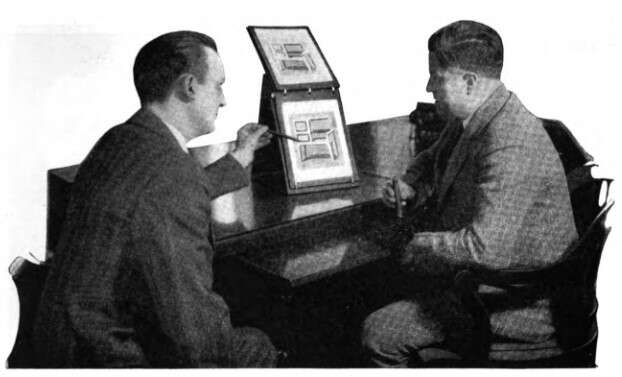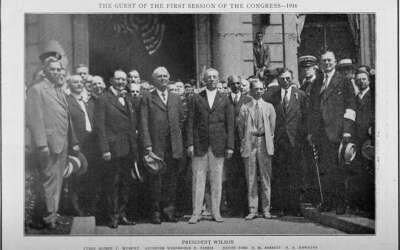I recently had an exchange with a sales professor at an Illinois university who was asked to contribute to a research paper on the role of “salesperson as educator”. The premise, to his dismay, was the idea that the salesperson acting as an educator was a new requirement, and is emerging as an important element. He reached out to me asking my opinion on “sales reps as educators” in the history of the profession. My immediate answer was that the original role of the salesperson was to educate. As the modern profession was taking shape, the focus of the role was to provide a service, both to the manufacturer of the solution they were selling, but more through the lens of educating the buyer.
Let’s take a look at what that idea of “service” and “education” meant back in the early 1900s, and why the GOAT of sales philosophers, Arthur Sheldon, proclaimed:

Arthur Sheldon – the G.O.A.T. of sales philosophers
“True salesmanship is the science of SERVICE. Grasp that thought firmly and never let go.” – Arthur Sheldon, The Art of Selling, 1911.
For many years, salespeople going town-to-town were the source of information in those towns. At its core, the reason salespeople were welcome is because of their capacity to educate.
“The traveling salesman is, in a certain sense, looked upon as a newspaper; that is, he is the principal source from which information of the outside world is gained by the merchant.” – Salesmanship Magazine, 1903
However, as the early 1900s took shape, the progressive era of the Industrial Revolution was taking hold. Manufacturing processes and possibilities were multiplying just like AI (artificial intelligence) is today. The consumer market, whether industrial or individual, didn’t know what was possible. As new possibilities were developed, the sales reps’ role was to take those solutions into the markets and educate.
Part of the admiration for salespeople came from the idea that they were educators. The telephone, the electric light, the power current – salespeople took these things to market and educated buyers on what they were and what was possible.
“The man who first sells any article in any place must educate the public up to the idea of his proposition. It takes time and a great deal of persistent hammering to make the majority of people see the value of anything.” – Gordon Pope, The Process of the Sale, 1920
Pope went on to talk about the Gillette Safety Razor. The entire proposition is based on educating the prospect on what’s possible…because nobody had ever heard of a safety razor before.
It was certainly a focus in retail. “Salesperson an educator” was an entire section of the 1926 book, Salesmanship by Charles Henry Fernald.
Some books, like Textbook of Salesmanship by Frederick Arthur Russell in 1924 talked about the side benefit of educating the customer:
“Many a buyer feels a desire to have his choice vindicated. If he purchases a quality article at a relatively high price, he wants to be fortified with reasons for making the outlay. If he is served by a salesman who knows his goods, these reasons will be brought out and the buyer convinced that he made a wise purchase. The buyer who has been so educated takes a pleasure in discoursing on the merits of his purchase, unconsciously utilizing the arguments and facts presented to him by the salesman.” – Frederick Arthur Russell, Textbook of Salesmanship, 1924
Dr. Frank Crane in his 1923 version of Ten Commandments of Selling spoke of the idea that salespeople assume too much knowledge on behalf of the customer, and adds, “They cannot conceive the extent of my ignorance.”
Arthur Dunn, who was one of my favorites, has a quote in his 1922 book Scientific Selling and Advertising that says:
“When you call to sell a man you do him a threefold service: (1) You save him time, (2) You educate his judgment, (3) You cause to be delivered to his door the thing he orders.”
Another one from H.G. Kenagy from 1931:
“The best salesmen don’t sell goods alone, they sell helpful ideas. The salesman becomes a teacher, a trade stimulator.”
Frederick A Russell in his 1933 book, Textbook of Salesmanship, believed “Selling goods is merely being a professional buyer for the customer.” – That, to me, means education.
I’ve got a billion of them…I’ll leave you with this one from 1911…
“No it is not true, as learned theorists have said, that every great invention springs into life because it is demanded by the nation. It springs into life and nobody wants it. It is the ugly duckling. Everybody prefers ten cents to it, until a few salesmen take it in hand and explain it.” – Herbert N. Casson, Ads and Sales, 1911
There is very little “new” in the sales profession. In many cases, what feels new is…and was…the right way to be a sales professional from the beginning.

My name is Todd Caponi, CSP® I’m a sales keynote speaker who also teaches revenue organizations how to leverage transparency and decision science to maximize their revenue capacity. It’s what I do…teach sellers, their leaders, well…entire revenue organizations how we as human beings make decisions, then how to use that knowledge for good (not evil) in their messaging (informal and formal), negotiations, and revenue leadership. I wrote a book Book Authority had listed as the 6th best sales book of all time (𝘛𝘩𝘦 𝘛𝘳𝘢𝘯𝘴𝘱𝘢𝘳𝘦𝘯𝘤𝘺 𝘚𝘢𝘭𝘦), and a second award-winning book (𝘛𝘩𝘦 𝘛𝘳𝘢𝘯𝘴𝘱𝘢𝘳𝘦𝘯𝘵 𝘚𝘢𝘭𝘦𝘴 𝘓𝘦𝘢𝘥𝘦𝘳).

Reach out if you want to discuss The Transparency Sale sales methodology, or really…anything else (sales kickoffs, workshops, keynotes, the economy, history, etc.)! Email info@toddcaponi.com or call 847-999-0420.
Sign up for the newsletter for more of my nonsense in your inbox every other week, with some sales history sprinkled on top…Sign Up – The Transparent Newsletter





This is so on task! Sales is there to educate. The idea of “overcoming objections” always rubs me the wrong way. You are there to educate, and if they “object” it means they don’t understand, or someone else is doing it better than you…either way education is how you both win. Great post Todd, thanks for the research.